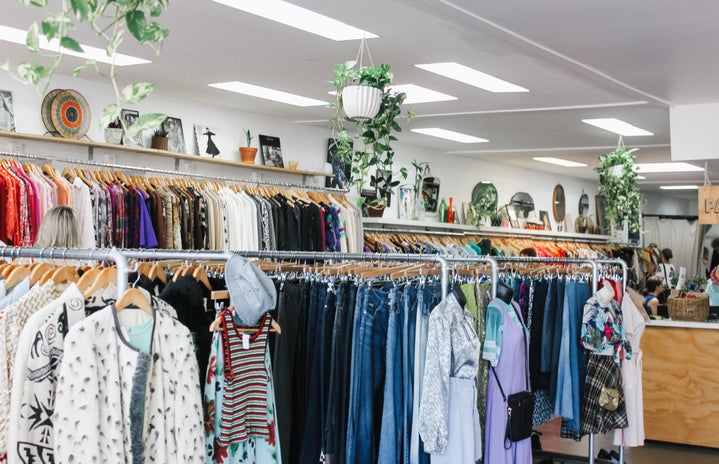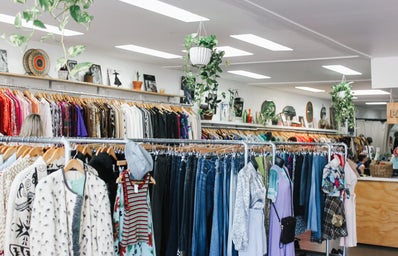Charity shops, Depop, Vinted, and car boot sales. Shopping second-hand has never been as popular as it has been in 2023.
The second-hand market is now a huge industry with the sales of second-hand goods soaring by 15% to £21 billion last year. The cost-of-living crisis and climate change have made many people start to look at other ways to buy clothing, which has given the second-hand market the opportunity to grow. People might also prefer to buy second-hand to expand on their individuality in a stylistic way. Social media has also helped normalise second-hand shopping with many TikToks of Vinted hauls and ‘Come charity shopping with me’ videos going viral. In November 2023, the hashtag “vintage” has 28.7 billion views on the app. Additionally, Love Island began its partnership with Ebay in 2022 after previously only partnering with fast fashion brands, which has made second-hand shopping more mainstream with the rebranding of ‘preloved’. These are all examples of how second-hand is moving from the fringes of society to a more mainstream space.
More and more people are moving away from fast fashion to more eco-friendly ways of shopping. Depop and Vinted are two of the biggest names in the second-hand market with an On the Money survey finding that Vinted is becoming the most used second-hand platform with huge growth to the site in the past two years, going from 1.2 million members in 2021 to over 8 million in 2023. Charity shop sales also grew by 15.1% between January and March compared with the same three months last year. There are also more consumers turning to car boots not only to save money but to be more sustainable, with organisers of Peckham Car Boot saying that there has been a renewed demand and demographic of buyers and sellers. It’s no surprise that the resale market is expected to rise by 67.5% by 2026.
According to a survey from Unidays members, 75% of Gen Z’s are shopping second-hand and 37% are reselling their clothes. The second-hand market is a great way for people to make money on their own terms. There are even sellers that make a living through selling on Depop such as Isabella Vrana, who is a well-known name and has generated sales of £800,000 in the last eight years on the resale site with her business continuing to grow.
Even if price is not a factor, shopping second-hand is something that everyone can get involved in to help slow down climate change. More than 100 billion garments are produced worldwide every year with 75% of them ending up in landfill. The fast fashion sector contributes to 10% of climate change and with trends coming and going, people end up discarding these items and buying more clothes so the cycle is never-ending. The environmental impact is 70 times lower when reusing textiles and promotes a circular economy which is more sustainable. Additionally, second-hand clothes are kept on average 14 years longer than brand-new items, indicating that people love finding unique pieces that align with expressing their personal style.
Resale rates contribute to the slowing demand for new fashion, with 9 out of 10 purchases made on Depop displacing a brand-new purchase, including second-hand fast fashion items. But shopping second-hand risks becoming unsustainable if the consumption of fashion is still high. Slowing down consumption rates should be a priority regardless of where an item is being purchased from and its brand. The most important thing to consider when buying clothes is how much will you wear them, and how long it’s going to be in your wardrobe. Working towards purchases being long term for your wardrobe is the ultimate goal for improving your sustainability. Second-hand shopping could also be improved for the plus-size community. The items on resale sites and in charity shops are limited in their variety of sizes, placing some consumers in a place of privilege.
Buying second-hand means you could potentially get a sold-out Zara piece for less money or buy a one-off vintage item that no one else will have. It’s more exciting whilst also being better for the planet and less expensive. The demand is high and seems like it is here to stay. By people committing to consuming less and cherishing their second-hand gems, we collectively take a positive step to being more sustainable.

